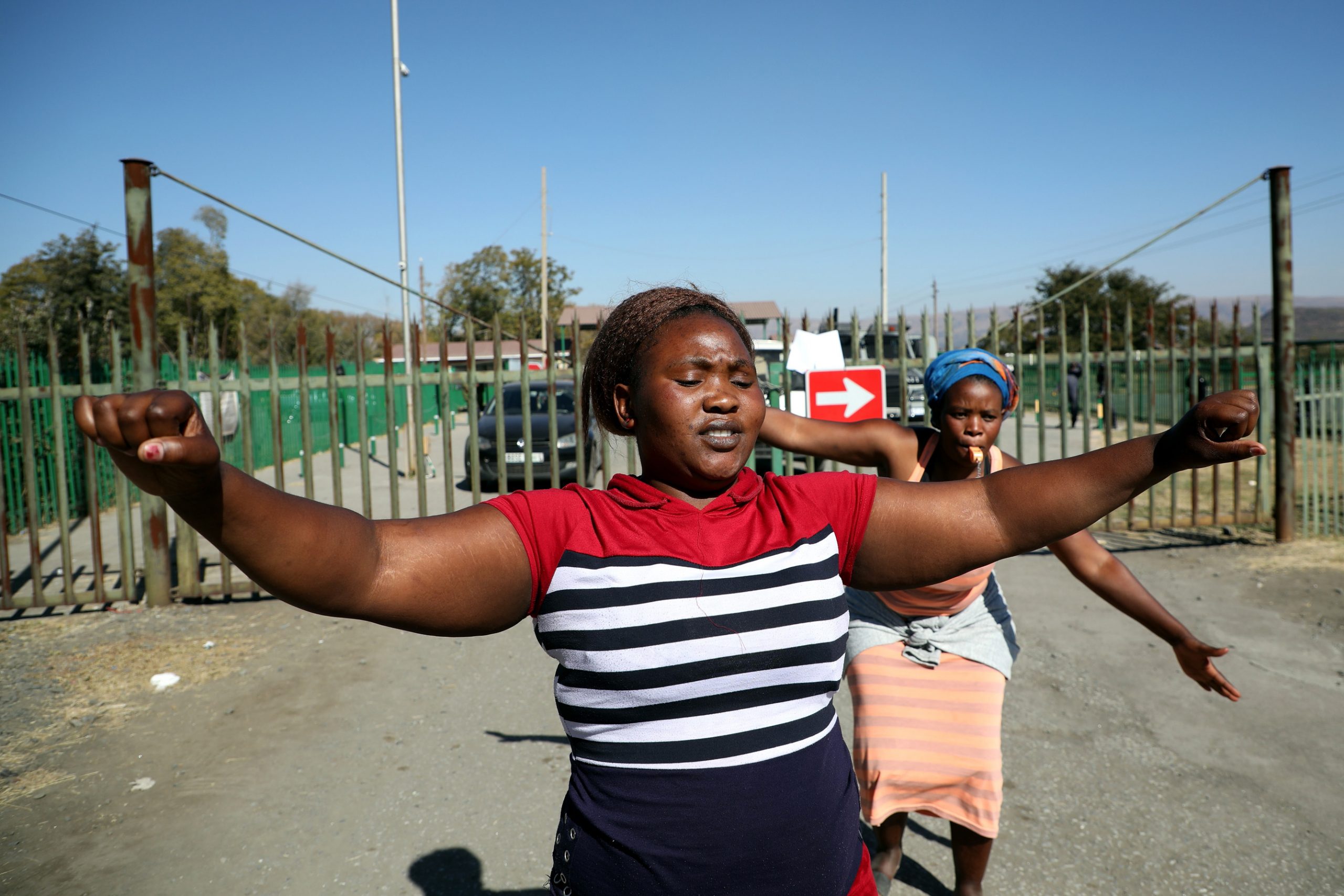Sexually harassed women miners speak out
After years of vulnerability, cover-ups and fear of losing their jobs, LanXess’ women miners are slowly speaking out about sexual harassment in the workplace and the effects on their mental health.…
Author:
9 September 2019

In May 2018, rock drill operator Katlego Mogwera, 35, was taking a lunch break after a training course. Her supervisor, whose name is already in the public domain, allegedly summoned Mogwera and held her in a sexually inappropriate manner, says Mogwera’s trainer, Abby Motsumi.
The LanXess-run Rustenburg Chrome Mine in North West province, which employs Mogwera, commissioned the training. It was conducted at Sibanye’s UG2 mine, which falls under the Sibanye Stillwater mine, situated a few kilometres from the LanXess mine. After the encounter, Mogwera’s mood had changed instantly, Motsumi recalls. He has intensive knowledge of the case and is authorised to speak to the media.
Motsumi says Mogwera told him of several incidents of harassment she allegedly endured at the hands of her supervisor, adding that the man allegedly requested sexual intercourse if she wanted to be upgraded from her rock driller post. Motsumi adds that Mogwera said her supervisor would come to her house uninvited and “act like the man of the house.”
She refused to have sex with her supervisor, which resulted in her having to continue to drill rocks using heavy machinery. The supervisor subsequently made her working conditions unbearable.
Related article:
According to Motsumi and the National Union of Metalworkers of South Africa (Numsa), Mogwera reported the harassment to the mine’s human resources department. Then human resource manager Amos Mkhatshwa allegedly told Mogwera that the supervisor had “feelings for her” and that if she was found to be lying about being sexually harassed, she would be fired.
But no action was taken after Mogwera lodged the complaint with mine management and this led to her becoming clinically depressed. She spent a month in hospital.
An internal memo dated 29 July 2019 from the mine’s acting chief executive, Tumi Mbatha, which was circulated to staff and contractors and which New Frame has seen, said Mkhatshwa was leaving the employ of the mine at the end of August. However, “his suspension is an internal matter and it is not related to any sexual harassment cases”, according to LanXess Chrome Mine managing director Benjamin Marais.
Suspended, but briefly
Motsumi says that only after Mogwera was hospitalised did Mkhatshwa begin to take statements from witnesses and an inquiry was launched. According to Numsa, the supervisor was suspended. But before the completion of the inquiry or any verdict, he was back at work.
The mine’s decision to bring the supervisor back to work without any explanation caused an outcry. For this and other unrelated reasons, almost 300 Numsa workers at the mine embarked on a protest in late June to “fight against sexual harassment and tyranny”. The strike comprising of sit-ins underground lasted for more than a week.
Numsa says the workers risked their lives in this type of sit-in and that they “suffered underground, breathing in potentially toxic fumes, sleeping in the biting cold, sacrificing time away from the comfort of their families and their homes”.
About 12 of the workers were hospitalised after being rendered unconscious while they were underground for the sit-in.
Related article:
Dorrah Mogatusi, 37, is a mother of three. She is one of the people who went underground during the protest to play an active role in encouraging her male colleagues and fellow izimbokodo (women) who were underground to remain resilient and strong.
“We helped each other a lot underground,” she recalls, adding that it was extremely difficult and embarrassing for women, including herself, who had been menstruating during the sit-in.
She says it was worth the sacrifice. “I want us to have equality, that’s why I went underground. I want harassment of women to come to a stop and even if it meant that we sit underground for another week, we’d have done that just to make sure justice is served.”
Mogwera’s wish was to see the mine taking appropriate steps as she felt unsafe at work. But without recourse from her seniors, she ended up opening a criminal case against her supervisor at the Rustenburg police station. The matter has not been heard in court because of numerous postponements.

Positive outcome for the sit-in
Numsa’s North West coordinator, Mere Boase, says the unity of the workers played a crucial role during the strike, adding that their sacrifices yielded positive outcomes.
“These women brought change at LanXess,” he says, reflecting on the role that women specifically played during the strike. “I was so touched to see that there were so many women underground during the strike. Knowing the mine environment, the number of women I physically saw coming out from underground was really touching.
“That environment is still hostile for women,” Boase says, alleging that there are dozens of males in senior positions at the mine who have sexually harassed women. He added that a lot of women in the mine are scared of speaking out as they fear losing their jobs. This is a view shared by other former and current workers at the mine.
Mogwera is the first person from this mine to speak out publicly about being sexually harassed. The support she has received from Numsa and her fellow workers may be a good start to helping the many women who have been sexually harassed at the mine, who have not yet found the courage to speak out as they fear losing their jobs.
The night I won’t forget
Mosadiwamarope Dominica Motsemme, 53, is a mother of three. She’s been contracted to work as a key controller since 2007. She was absorbed by the mine in 2012 and became a permanent employee. Three years into her permanent post, she experienced sexual harassment.
“On 31 August 2015, I was on night shift and it was a bad day that I will never ever forget in my life,” reads her diary, which she’s written so that her children will have a record of what she experienced.
She says she was sexually harassed, allegedly by her co-worker Edwin Mphekgoana, on that night. “I was sitting at key control room and when Mphekgoana came inside he just put his hand between my thighs. I asked him why he was doing that,” she says, adding that Mphekgoana stared at her without uttering a word.
After this, she did not feel safe in the key control room and decided to stay in the main control room, where she called her foreman to explain what she had experienced. She says the foreman told her that he would deal with the matter the following morning.
The following morning, she went to report the incident and found another underground foreman on duty, with Mphekgoana. When she tried to tell her story, the underground foreman allegedly said, “‘You are speaking lies and we will put you on a lie detector’ and I will be fired from the company,” she recalls.
Related article:
Not being believed by her seniors made her feel frustrated and traumatised, she says. Like Mogwera, she was diagnosed with clinical depression, which affected her health. “The doctor said my blood pressure was too high, even now I am still taking the treatment. I am using the treatment for the rest of my life,” she says softly.
Boase says all the victims of sexual harassment whose cases have been disregarded show similar psychiatric effects. “It’s a very sad situation. I hope they get support from family structures and at work in order to recuperate from this.” Following Motsemme’s diagnosis, a disciplinary inquiry against Mphekgoana was launched.
Shortly before the inquiry, however, a woman from the women’s structure (the committee responsible for addressing women’s issues at the mine) advised her to drop the case. “I did not want to listen to any of her instructions or advice,” says Motsemme, “because I was informed that when I drop the case, Edwin will then open a case against me [accusing me of lying] and the company would find fault [with] me, which will lead to my dismissal,” she says, adding that her working conditions have not improved since her refusal to drop the case.
Verdict with no sympathy
The written verdict of the disciplinary inquiry says advocate Russell Moletsane, who led the inquiry, said Motsemme “failed to call witnesses to corroborate her evidence and no satisfactory explanation was given as to why she had decided not to call them”.
Motsemme says she discovered that all her foremen had testified for Mphekgoana, resulting in her not having any witnesses.
Moletsane wrote in the verdict that although Motsemme called her foreman on the night of the incident, she “failed” to notify him about the incident. “In my view, a reasonable person in the position of Motsemme would have brought such serious matter to the attention of her supervisor immediately.”
Moletsane concluded: “Motsemme is an unreliable witness whose evidence and credibility cannot be trusted. I come to the finding that the complainant has been unable to discharge the onus vested in her to prove that the accused has committed sexual harassment … I find the accused employee [Edwin Mphekgoana] not guilty of the alleged misconduct.”
Related article:
Motsemme has highlighted the information that she considers grossly inaccurate in yellow. It makes up a large part of the written verdict. “I was shocked to see some of the things they wrote. I asked to see the recordings of the hearing and they refused, because I wanted to hear who lied or whether who fabricated the information in the verdict.”
She says the fabrication of events during the inquiry was purposeful to discredit her complaint. Instead, she was framed as someone who does not like working with men. “Motsemme herself (when she was putting her version to one of Mphekgoana’s witnesses) confirmed that she does not allow men in the key control room at night,” says Moletsane’s verdict.
Sexual harassment must stop
Five years later, Motseme still has not summoned up the courage to open a case of sexual harassment at a police station. “Other men must [realise that] for women to work in the mine is not a favour, we must not take advantage of women. Maybe there are more men who are doing the same thing and it has to stop,” says Motsumi, who is a witness in Mogwera’s case.
Marais says he is not aware of Motsemme’s case, saying: “We are very strict when it comes to sexual harassment policy and women in mining … We have a very strict policy and we do not tolerate sexual harassment … We will investigate all the cases brought to our attention.”




